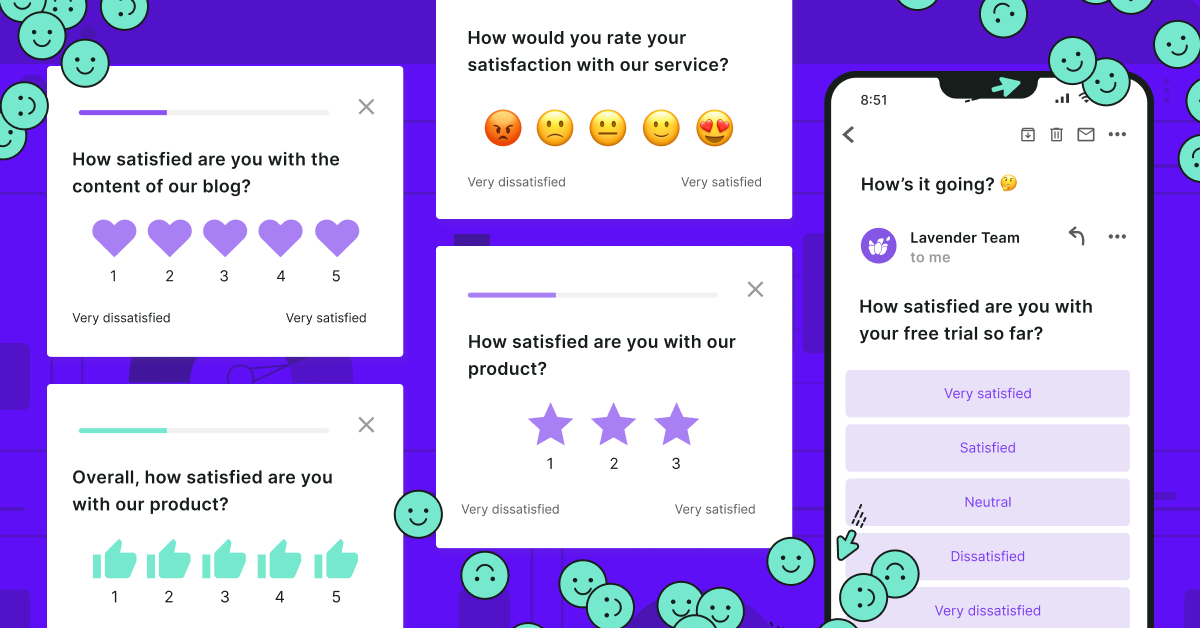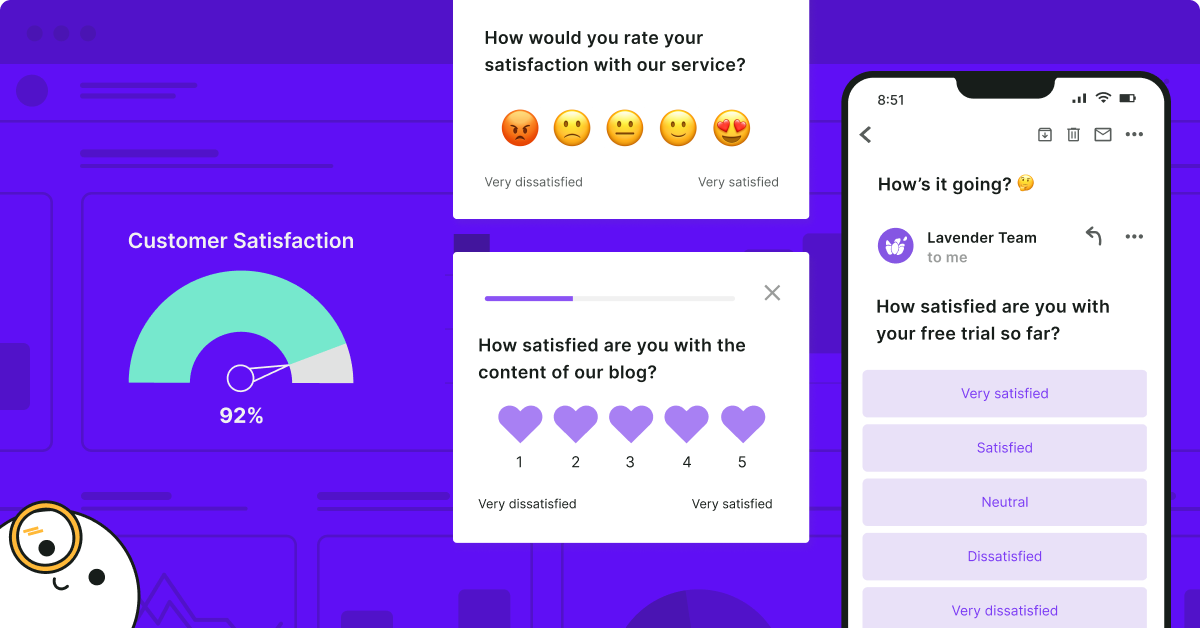A high level of customer satisfaction is a business goal for every brand and a key to its success. If you’re reading this article, it means you probably agree with this statement, and you are looking for tips on how to improve customer satisfaction.
Customer satisfaction affects your business revenue. Low customer satisfaction levels mean your retention rates are likely to be low, too. According to a book titled Marketing Metrics, businesses have a 60-70% chance of selling to an existing customer while the likelihood of selling to a new customer is only 5-20%.
With this in mind, can you afford to offer poor customer experience? The tips we collected in this article will help you find out how to identify dissatisfied clients by collecting customer feedback.
Using customer insights, you can improve the experience for your customers, boost customer satisfaction, and increase your retention rate.

How to improve customer satisfaction?
So how can you improve customer satisfaction in today’s customer-centric world? These are some general rules that apply to all businesses, no matter their size or industry.
- Collect customer feedback: To better understand your customers’ needs, you need to listen to them and know what they want. By using surveys, you can measure customer satisfaction and discover what product improvements your customers request.
- Turn customer feedback into action: Now that you know what your customers want, it’s time to turn their feedback into action. For example, if a customer said your onboarding sessions are not helpful, it’s worth working with your team to improve them.
- Improve your product or service: You should constantly strive to improve your product or service based on customer feedback. For instance, if the customer requests features you can’t yet deliver, always update them on the progress. This lets you keep customer satisfaction levels high.
- Follow up with your customers: Have you made an improvement based on what your customer has told you? Follow up with the customer to let them know about it. Keeping your customers in the loop shows that your business values customer feedback.
So, improving customer satisfaction comes down to gathering customer feedback and then acting on it. But, you might be wondering what practical steps you can take today that will bring you closer to your goals. As a customer-centric company, here is what we suggest:
- Offer multi-channel support
- Make collecting feedback a company process
- Measure customer satisfaction regularly
- Ask for feedback across all touchpoints
- Actively ask customers for feedback
- Share feedback across all your teams
- Reply to all feedback
- Act on complaints and negative reviews
Offer multi-channel support
The easier your customers can contact you, the higher your customer satisfaction levels. To offer multi-channel support, you need to be where your customers are.
Consumers use various channels and devices to make purchases. That’s why it’s worth having a presence to cover any channels your customers use. These channels include:
- Live chat support
- Social media support
- Email support
- Phone support
In short, what’s the one biggest benefit of multi-channel support? You can engage your customers over their preferred method of communication. So ensure that you offer top-quality support across all the channels. This lets you boost brand credibility as well as your customer satisfaction.
Don’t know how happy your customers are with the support you offer? Try sending them this free, ready-to-use survey to find out:
Make collecting feedback a company process
Who knows better what your customers want than the customers themselves?
Customer feedback is one of the most powerful resources your business can have. It’s a clear indicator of how pleased your customers are with your brand, services, and products. Above all, customer feedback indicates what your customer satisfaction levels are.
It’s no surprise, then, those customer-centric companies are 60% more profitable than companies that don’t focus on customers. Here’s one easy, 2-step recipe to become a customer-centric company:
- Collect customer feedback through surveys using different channels.
- Turn that feedback into action.
It's as simple as that. You collect customer feedback. You act on customer feedback. You improve the customer experience and increase customer satisfaction. Rinse and repeat.
Taking customer feedback into account shows you value customers’ opinions.
Here's an example of a user experience survey:
With that out of the way, let’s discuss how else you can improve customer satisfaction.
Measure customer satisfaction regularly
A study by Bain & Company reveals that
companies with a customer experience mindset drive revenue 4-8% higher than the rest of their industries.
But how do you know your customer satisfaction scores?
The first step is measuring customer satisfaction. As a result, you can receive valuable insights into areas to improve. But also find out what works well.
So how to start measuring customer satisfaction? Here are the three most important customer experience metrics:
NPS (Net Promoter Score)
Ask how likely customers are to recommend you, and predict repurchases and referrals.
CSAT (Customer Satisfaction Score)
See if your customers are happy with your product or service.
CES (Customer Effort Score)
Measure the ease of doing business with your company with the Customer Effort Score survey.
By running these three customer surveys you can understand the drivers for improving customer satisfaction.
For example, imagine you know what your customers are complaining about. And you also know what they like about your product or services. Isn’t it then easier to keep them happy?
Suppose a customer mentions slow response times when giving a low CSAT score. You know you’ll need more people in your support team!
YOU MAY ALSO BE INTERESTED IN: User satisfaction survey template
Ask for feedback across all touchpoints
It’s simple. Ask customers for feedback where they are most engaged. There are many survey distribution channels for you to choose from.
For example, if you’re looking to run CSAT surveys after closing a ticket, you can use email surveys.
And if you're looking for feedback on a specific feature of your web app, run an in-product survey. You can trigger it to appear when a customer uses that feature.
There's also an extra advantage of in-product surveys besides laser-sharp targeting. If you integrate your survey software with a product analytics tool, you'll be able to connect qualitative and quantitative data points to understand your clients even better. Survicate, for example, lets you connect with tools such as Mixpanel, Amplitude, and Productboard.
.png)
So what happens when you collect customer feedback across all your channels? You can then improve the entire customer journey.
Here are all the survey channels you can use with Survicate:
And here's an example of a survey you can run after your customer interacts with your product:
Or a survey for customers who contacted your customer support:
Actively ask customers for feedback
Don’t wait for clients to leave negative feedback on social media. Instead, encourage customer feedback and be proactive about collecting it.
For instance, did a customer just buy from you? Ask what made them buy and what you can do to increase their post-purchase customer satisfaction.
If you want to launch a new feature, it’s worth asking your customers what their expectations are. It’s a great way to make sure the new feature will meet their needs. This, in turn, allows you to boost customer satisfaction levels.
Share feedback across all your teams
Let’s face it, customer feedback is useless if it goes unheard. That’s why analyzing and responding to customer feedback should be a company-wide effort.
If a piece of feedback concerns mobile application bugs, it’s best addressed by the product team.
But what if a customer complains about your recent social media campaign? Then it’s your marketing team that needs to respond.
The more, the merrier. That is, the more people in your company collaborate on customer feedback, the higher your customer satisfaction.
Sometimes you even need to get the management involved. For example, imagine a customer made a custom feature request. It turns your product roadmap upside down. To ship the new feature for the customer, you need the approval of your management. So the higher-ups in your company will read the feedback before they approve the feature.
In other words, you need to pass each piece of feedback to the right team.
Also, you should foster a sense of customer-centricity in your company. And encourage every team to set some time aside each month to analyze customer feedback.
The ultimate reward is that all your teams will know exactly what your customers want. Your departments will then find it easier to sync their efforts.
Reply to all feedback
Whether you get positive or negative customer feedback, it’s worth taking the time to respond to it.
If a customer is happy, you can capitalize on it. For example, by getting more positive reviews, case studies, or testimonials.
But why is this important? 88% of consumers trust user reviews as much as personal recommendations. So building social proof can encourage potential clients to buy from you.
And if a consumer is upset, you should try to find out what makes them unhappy. You can then improve your product or services and reduce the likelihood of churn.
What to do when you get new feedback? If it’s negative, make sure to apologize to the customer. In high-risk cases, you can even offer compensation. Here’s a sample response to negative customer feedback:
Hi John,
Thanks for taking the time to rate us and thanks for the honest feedback! We’re sorry to hear about [insert the reason the customer is unhappy here].
Please rest assured we’ve passed on your comments to the right team. They’ll be fixing things up very soon. Your feedback will help us improve!
Is there anything we can do to make up for the bad experience you’ve had with us? Please let us know how we can help.
On the other hand, if the feedback is positive, try asking the customer a favor. Some people need a little encouragement to leave you a positive review or a testimonial.
Above all, the least you can do is thank the customer for taking the time to answer your survey. Because following up on customer feedback is a surefire way to increase customer satisfaction.
Here are some more customer satisfaction tips about how to handle customer feedback:
- Customers appreciate it when you acknowledge you hear their voices.
- When you turn feedback into action, it helps you drive loyalty in your existing customers.
- Customers who have a positive experience with your brand can become your brand advocates
Replying to customer feedback can only boost your customer satisfaction levels. Think of it this way. If you devoted 10 minutes of your time to answer a survey, would you want the company to follow up with you or not?
Act on complaints and negative reviews
Did you know that complaints and negative reviews are a source of valuable feedback? When you analyze them, you know exactly what your customers want.
So treat complaints and negative reviews as an opportunity. It’s a chance to build closer relationships with your customers. Here are some tips to help you:
- Always contact the customer directly after they’ve left you a negative review
- Try to fix their issue and update them on the progress
- Reply to negative reviews on review sites on one condition. Only when you’re sure it won’t trigger an even more emotional response from the customer and harm your business
- Keep track of the reviews your customers are leaving
- Let your customers know you’ve acknowledged and resolved their complaint
Those tips will help you improve your customer satisfaction levels. Why? More than two-thirds of users trust reviews more when they are a mix of negatives and positives.
As a result, negative reviews won’t kill your business if you respond to them well.
How to start boosting customer satisfaction
What’s the biggest advantage of running surveys and measuring customer satisfaction? It tells you a lot about what to improve and how customers view your business.
If you’d like to improve customer satisfaction levels with a great customer satisfaction tool, choose Survicate. Survicate provides a generous freemium plan which gives you:
- Unlimited survey responses
- Unlimited users
- 7 days of collection time per survey
- 125+ free survey templates
- Native integrations with a host of tools
Running any survey with Survicate is as easy as you could possibly imagine it to be. You don’t need to worry about the technical setup, either. Using an intuitive survey builder, you can get your polls up and running within minutes.
Conclusion
Customer satisfaction is the pillar of your company's success. Although you won't be able to improve it overnight, the tips we shared in this article offer practical and actionable ways to get started on the journey today.
The best way to set about truly pleasing your customers is to find out what they think. This is made extremely easy with Survicate, which offers 125+ ready-to-use templates so you leave no stone unturned while collecting insights. With a freemium trial that comes with unlimited responses and all unlimited users, you really cannot go wrong. If you haven't already, sign up for your free trial and start collecting actionable customer feedback!

.webp)






.svg)
.svg)
.svg)

.svg)


.svg)







.svg)




.svg)

















.svg)






























.svg)

.svg)
.svg)

.svg)



.svg)





.jpg)
.svg)

.svg)







